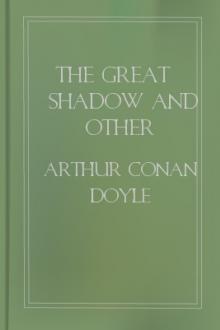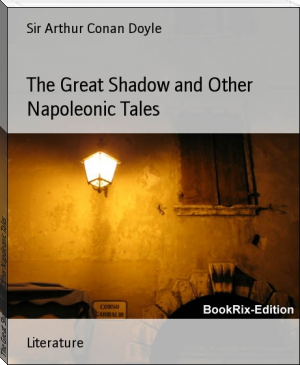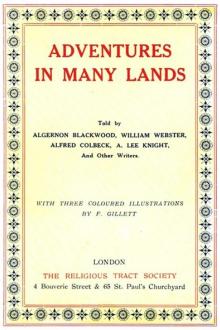The Great Shadow and Other Napoleonic Tales by Arthur Conan Doyle (different e readers txt) 📕

- Author: Arthur Conan Doyle
- Performer: -
Book online «The Great Shadow and Other Napoleonic Tales by Arthur Conan Doyle (different e readers txt) 📕». Author Arthur Conan Doyle
A thin rain was falling and the damp air held the smoke low, so that we could only catch glimpses of what was doing just in front of us, though the roar of the guns told us that the battle was general all along the lines. Four hundred of them were all crashing at once now, and the noise was enough to split the drum of your ear. Indeed, there was not one of us but had a singing in his head for many a long day afterwards. Just opposite us on the slope of the hill was a French gun, and we could see the men serving her quite plainly. They were small active men, with very tight breeches and high hats with great straight plumes sticking up from them; but they worked like sheep-shearers, ramming and sponging and training. There were fourteen when I saw them first, and only four left standing at the last, but they were working away just as hard as ever.
The farm that they called Hougoumont was down in front of us, and all the morning we could see that a terrible fight was going on there, for the walls and the windows and the orchard hedges were all flame and smoke, and there rose such shrieking and crying from it as I never heard before. It was half burned down, and shattered with balls, and ten thousand men were hammering at the gates; but four hundred guardsmen held it in the morning and two hundred held it in the evening, and no French foot was ever set within its threshold. But how they fought, those Frenchmen! Their lives were no more to them than the mud under their feet. There was one—I can see him now—a stoutish ruddy man on a crutch. He hobbled up alone in a lull of the firing to the side gate of Hougoumont and he beat upon it, screaming to his men to come after him. For five minutes he stood there, strolling about in front of the gun-barrels which spared him, but at last a Brunswick skirmisher in the orchard flicked out his brains with a rifle shot. And he was only one of many, for all day when they did not come in masses they came in twos and threes with as brave a face as if the whole army were at their heels.
So we lay all morning, looking down at the fight at Hougoumont; but soon the Duke saw that there was nothing to fear upon his right, and so he began to use us in another way.
The French had pushed their skirmishers past the farm, and they lay among the young corn in front of us popping at the gunners, so that three pieces out of six on our left were lying with their men strewed in the mud all round them. But the Duke had his eyes everywhere, and up he galloped at that moment—a thin, dark, wiry man with very bright eyes, a hooked nose, and big cockade on his cap. There were a dozen officers at his heels, all as merry as if it were a foxhunt, but of the dozen there was not one left in the evening.
"Warm work, Adams," said he as he rode up.
"Very warm, your grace," said our general.
"But we can outstay them at it, I think. Tut, tut, we cannot let skirmishers silence a battery! Just drive those fellows out of that, Adams."
Then first I knew what a devil's thrill runs through a man when he is given a bit of fighting to do. Up to now we had just lain and been killed, which is the weariest kind of work. Now it was our turn, and, my word, we were ready for it. Up we jumped, the whole brigade, in a four-deep line, and rushed at the cornfield as hard as we could tear. The skirmishers snapped at us as we came, and then away they bolted like corncrakes, their heads down, their backs rounded, and their muskets at the trail. Half of them got away; but we caught up the others, the officer first, for he was a very fat man who could not run fast. It gave me quite a turn when I saw Rob Stewart, on my right, stick his bayonet into the man's broad back and heard him howl like a damned soul. There was no quarter in that field, and it was butt or point for all of them. The men's blood was aflame, and little wonder, for these wasps had been stinging all morning without our being able so much as to see them.
And now, as we broke through the further edge of the cornfield, we got in front of the smoke, and there was the whole French army in position before us, with only two meadows and a narrow lane between us. We set up a yell as we saw them, and away we should have gone slap at them if we had been left to ourselves; for silly young soldiers never think that harm can come to them until it is there in their midst. But the Duke had cantered his horse beside us as we advanced, and now he roared something to the general, and the officers all rode in front of our line holding out their arms for us to stop. There was a blowing of bugles, a pushing and a shoving, with the sergeants cursing and digging us with their halberts; and in less time than it takes me to write it, there was the brigade in three neat little squares, all bristling with bayonets and in echelon, as they call it, so that each could fire across the face of the other.
It was the saving of us, as even so young a soldier as I was could very easily see; and we had none too much time either. There was a low rolling hill on our right flank, and from behind this there came a sound like nothing on this earth so much as the beat of the waves on the Berwick coast when the wind blows from the east. The earth was all shaking with that dull roaring sound, and the air was full of it.
"Steady, 71st! for God's sake, steady!" shrieked the voice of our colonel behind us; but in front was nothing but the green gentle slope of the grassland, all mottled with daisies and dandelions.
And then suddenly over the curve we saw eight hundred brass helmets rise up, all in a moment, each with a long tag of horsehair flying from its crest; and then eight hundred fierce brown faces all pushed forward, and glaring out from between the ears of as many horses. There was an instant of gleaming breastplates, waving swords, tossing manes, fierce red nostrils opening and shutting, and hoofs pawing the air before us; and then down came the line of muskets, and our bullets smacked up against their armour like the clatter of a hailstorm upon a window. I fired with the rest, and then rammed down another charge as fast as I could, staring out through the smoke in front of me, where I could see some long, thin thing which napped slowly backwards and forwards. A bugle sounded for us to cease firing, and a whiff of wind came to clear the curtain from in front of us, and then we could see what had happened.
I had expected to see half that regiment of horse lying on the ground; but whether it was that their breastplates had shielded them, or whether, being young and a little shaken at their coming, we had fired high, our volley had done no very great harm. About thirty horses lay about, three of them together within ten yards of me, the middle one right on its back with its four legs in the air, and it was one of these that I had seen flapping through the smoke. Then there were eight or ten dead men and about as many wounded, sitting dazed on the grass for the most part, though one was shouting "Vive l'Empereur!" at the top of his voice. Another fellow who had been shot in the thigh—a great black-moustached chap he was too—leaned his back against his dead horse and, picking up his carbine, fired as coolly as if he had been shooting for a prize, and hit Angus Myres, who was only two from me, right through the forehead. Then he out with his hand to get another carbine that lay near, but before he could reach it big Hodgson, who was the pivot man of the Grenadier company, ran out and passed his bayonet through his throat, which was a pity, for he seemed to be a very fine man.
At first I thought that the cuirassiers had run away in the smoke; but they were not men who did that very easily. Their horses had swerved at our volley, and they had raced past our square and taken the fire of the two other ones beyond. Then they broke through a hedge, and coming on a regiment of Hanoverians who were in line, they treated them as they would have treated us if we had not been so quick, and cut them to pieces in an instant. It was dreadful to see the big Germans running and screaming while the cuirassiers stood up in their stirrups to have a better sweep for their long, heavy swords, and cut and stabbed without mercy. I do not believe that a hundred men of that regiment were left alive; and the Frenchmen came back across our front, shouting at us and waving their weapons, which were crimson down to the hilts. This they did to draw our fire, but the colonel was too old a soldier; for we could have done little harm at the distance, and they would have been among us before we could reload.
These horsemen got behind the ridge on our right again, and we knew very well that if we opened up from the squares they would be down upon us in a twinkle. On the other hand, it was hard to bide as we were; for they had passed the word to a battery of twelve guns, which formed up a few hundred yards away from us, but out of our sight, sending their balls just over the brow and down into the midst of us, which is called a plunging fire. And one of their gunners ran up on to the top of the slope and stuck a handspike into the wet earth to give them a guide, under the very muzzles of the whole brigade, none of whom fired a shot at him, each leaving him to the other. Ensign Samson, who was the youngest subaltern in the regiment, ran out from the square and pulled down the hand-spike; but quick as a jack after a minnow, a lancer came flying over the ridge, and he made such a thrust from behind that not only his point but his pennon too came out between the second and third buttons of the lad's tunic. "Helen! Helen!" he shouted, and fell dead on his face, while the lancer, blown half to pieces with musket balls, toppled over beside him, still holding on to his weapon, so that they lay together with that dreadful bond still connecting them.
But when the battery opened there was no time for us to think of anything else. A square is a very good way of meeting a horseman, but there is no worse one of taking a cannon ball, as we soon learned when they began to cut red seams through us, until our ears were weary of the slosh





Comments (0)